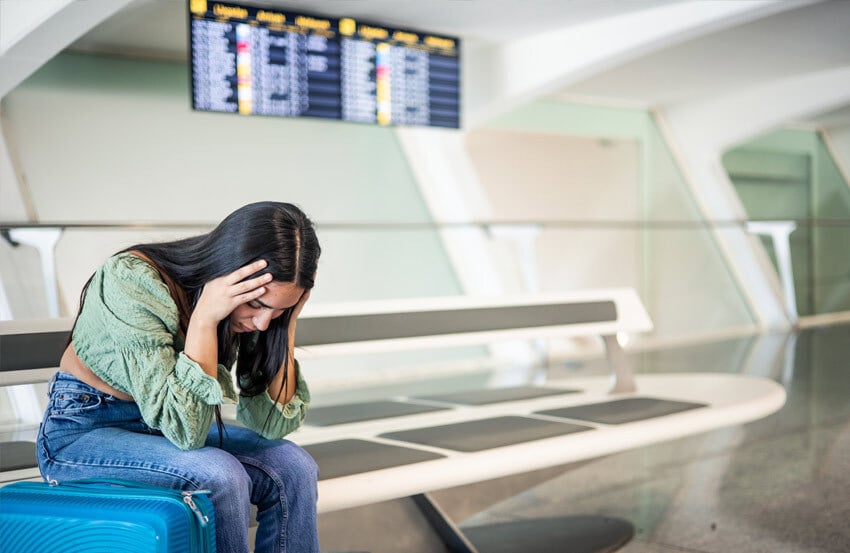Travelling can be stressful at the best of times. And, we're sure you'll agree with us when we say that missing a flight is the last thing you'd want to happen.
But, in the event that you do miss a flight, is it possible for your travel insurance policy to offer cover? We're here to help. Read on for everything you need to know!

Are missed flights covered by travel insurance?
Some insurance providers might offer cover for missed flights.
But, the level of cover provided can vary from provider to provider. So, you'll need to read the terms and conditions of your policy to see what you might be able to get.
Are missed flights covered by travel insurance as standard, or as an add-on?
Many insurance providers that offer missed flight insurance don't offer it as standard. Instead, it's usually offered as an add-on.
But, if providers offer cover for missed flights as standard, there might be limitations. For example, some policies don't offer cover for interconnecting flights. So, the best thing to do is to read your policy to see what's offered.
If it's not offered as standard or you don't have the level of cover you're looking for, contact your provider. They might be able to offer flight cover insurance as an add-on. Keep in mind, you'll have to pay more to get it added to your policy.
Helpful hint: Consider if paying extra for a flight insurance add-on is worth it. In the event you had to purchase an alternative flight out of your own pocket, it could cost hundreds of pounds.
What does travel insurance for missed flights cover?
Policies can vary from provider to provider. So, read the small print of your policy to see what level of cover is offered for missed flights.
In general, travel insurance usually offers missed flights cover for:
-
Public transport delays. If your train is delayed, for example, and you miss your flight because of it.
-
Road accidents. If you're in an accident, or there's an accident causing traffic delays. Sometimes, this is only on a motorway or a dual carriageway.
-
Car breakdown. If your car or vehicle breaks down and you're unable to get to the airport on time.
-
Extreme weather. If there are adverse weather conditions that prevent you from flying, like a snowstorm.
What doesn't it cover?
-
Bad time management. If you don't give yourself enough time to get to the airport and through security. It's usually recommended to arrive at the airport at least 2 hours before departure for short-haul flights. If you're flying long-haul, it's recommended that you arrive at least 3 hours before your flight.
-
Unannounced protests or civil unrest. If there's a protest, or another form of civil unrest that hasn't been publicly announced.
-
Roadworks or traffic not caused by an accident. If you experience road delays that haven't been directly caused by a car accident. Refusing airline assistance. If your airline offers alternative travel plans, and you don't accept.
Does travel insurance cover missed connecting flights?
In certain situations, travel insurance might cover connecting flights. But, this depends on your provider, so read the small print of your policy to see.
Your airline might offer you compensation for connecting flights. But, there's a few conditions to be aware of. Mainly, it comes down to the type of ticket you have, and there's two main types:
- Through ticket: This means a single ticket that covers all additional connecting flights. With a through ticket, you typically check your luggage at the first airport, and then collect them at your destination.
- Separate tickets: If you have connecting flights purchased with separate tickets, you may need to collect and re-check your luggage at the additional airports.
Let's take a look at what you might be entitled to, depending on which ticket you have:
If you have a through ticket
If your flight is delayed by the airline, it'll be their duty to offer compensation. Usually, this is in the form of an alternative flight.
With this type of ticket, the initial airline could also be required to offer compensation. Not only for the first flight they made you miss, but also for any connecting flights you have on the same ticket.
If you have separate tickets
If you have separate tickets, the first airline might not be required to give cover for the connection.
The same applies to the airline you purchased your connecting flight with. In this situation, your insurance provider could offer some assistance.
What should I do if I miss my original flight or connection?
If you miss your flight or connection, there are a few steps you can take to help minimise disruption.
First, go to the customer service desk. Once you get there, explain the situation to the airport staff. Sometimes, they can offer an alternative flight, or put you on standby. This is where you can make a same-day flight change.
If your luggage has been checked, an airport worker might be able to retrieve it before the plane takes off. But, if it's already departed, don't worry. Your luggage can be held safely at the destination until you get there. Phew.
Helpful hint: If you have a connecting flight with a different airline, you might need to claim and recheck your baggage.
Let's take a look at a few common scenarios, and whether you'd be entitled to cover:
If it was the airline's fault
Most insurance providers won't offer cover for delays that were caused by the airline.
In this situation, the airline is responsible for offering alternative flights. If needed, they should cover food and accommodation as well.
If it was your fault
If the airline wasn't at fault, it won't be under any obligation to offer you compensation. The same goes for your travel insurance provider.
If it was due to circumstances out of your control
If it was due to circumstances out of your control, you might be able to get cover from your insurance policy. Hooray!
But you'll usually need to provide evidence of what stopped you from getting to your flight. This brings us to our next section.
How do I make a claim for a missed flight or connection?
To make a claim and have it accepted, you'll likely need to provide proof of why your flight was missed.
For example, if you were in a road accident that prevented you from getting to the airport on time. Or, if the plane was unable to depart because of extreme weather.
In these types of situations, travel insurance providers can agree to provide compensation. Evidence can help to increase your chances of your claim being successful. Here are some examples:
-
Photos and testimonies of a road accident you've been in. For example, a screenshot of google maps to show the accident you've been in. Or, a first-hand account from someone who has witnessed your accident.
-
Travel documents. This includes things like your flight ticket.
-
Confirmation from a breakdown company. If your car broke down, and a breakdown company provided confirmation.
-
Proof that your airline acknowledged a delay. For instance, a statement on the airline's website.
How much can I claim?
Can I claim if I make my own travel arrangements after a missed flight?
How can I avoid missing my flights?
There's a few steps you can take to reduce the chance of missing a flight:
-
Get to the airport early. It's always a good idea to get to the airport with plenty of time to spare. Usually, the recommended arrival time is a few hours before your flight. This is so you can get through security and check-in.
-
Have the right documentation ready. You'll need to show your passport and flight ticket numerous times at the airport. For example, when passing through security, and once you get to the gate. Keep them handy to prevent time delays.
-
Know your gate number. Airports are big places. Have your gate number in mind so you can get to it on time. You'll also find directions to your gate throughout the airport.
-
If you can, check-in online. More and more airlines allow online check-in. It can save you from waiting around in lengthy queues and allow you to go straight to security. Boom!
-
Consider busy travel times. Certain times of the day, days of the week, and times of the year can be busier than others. Take this into account when working out how long it's going to take to get to the airport.
Will my return flight still be valid if I miss my original departure flight?
If you have a return flight with the same airline:
If you have a return flight with a different airline:
Compare travel insurance







